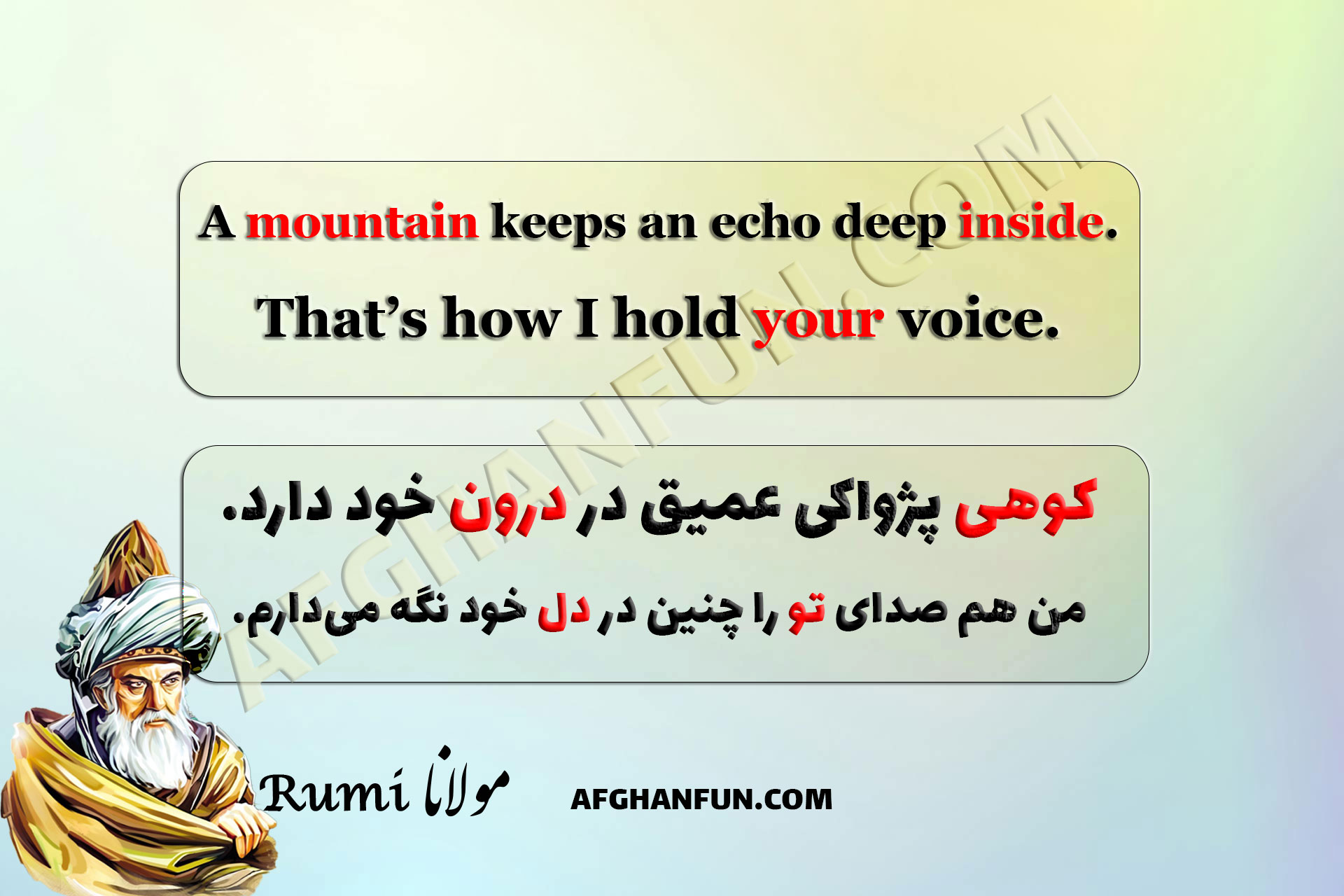The Deep Echo: Rumi’s Heartfelt Words
A mountain keeps an echo deep inside. That’s how I hold your voice.
Rumi
Rumi on Love and Memory: A Mountain’s Echo
کوهی پژواکی عمیق در درون خود دارد. من هم صدای تو را چنین در دل خود نگه میدارم.
مولانا
مولانا با استفاده از تصویر کوه، به حافظه و نگهداری صدا و احساسات اشاره میکند. کوه پژواکی عمیق در درون خود دارد که نشاندهنده قدرت حفظ و نگهداری است. مشابه این تصویر، مولانا میگوید که او صدای محبوب یا عزیز خود را در دل و در عمق وجودش نگه میدارد. این نگهداری، نه تنها حفظ یک صدا، بلکه نگهداشتن عاطفه، یاد و حضور فرد در دل است.
A Mountain’s Echo: Rumi’s Quote on Love and Connection
Кӯҳ пажвоки амиқе дар дохилаш нигоҳ медорад. Ман низ овози туро ҳамин гуна нигоҳ медорам.
МАВЛОНО ҶАЛОЛУДДИН МУҲАММАДИ БАЛХӢ
Муллоно бо истифода аз тасвири кӯҳ, ба хотира ва нигоҳ доштани овоз ва эҳсосот ишора мекунад. Кӯҳ пӯшидаги амиқе дар дохилаш дорад, ки нишондиҳандаи қудрати нигоҳдорӣ ва нигоҳ доштани чизе мебошад. Муллоно мегуяд, ки ман овози маъшуқ ё маҳбубамро дар дил ва дар амиқати вуҷудам нигоҳ медорам. Ин нигоҳдорӣ, на танҳо ҳифзи як овоз, балки нигоҳ доштани эҳсосот, ёд ва ҳузури шахс дар дил аст.
Rumi’s Timeless Quote: A Mountain Keeps an Echo Deep Inside
الجبل يحتفظ بصدى عميق في داخله. هكذا أنا أحتفظ بصوتك.
مولانا جلال الدین محمد الرومي
يستخدم مولانا صورة الجبل للدلالة على الذاكرة وحفظ الأصوات والمشاعر. الجبل يحتفظ بصدى عميق في داخله، وهذا يشير إلى القدرة على حفظ شيء عميق ومهم. يقول مولانا إنه مثل الجبل الذي يحتفظ بالصدى في أعماقه، فإنه هو أيضًا يحتفظ بصوت محبوبه في قلبه وداخل نفسه. هذا الحفظ ليس فقط لحفظ الصوت، بل هو أيضًا حفظ للمشاعر والذكريات والحضور العاطفي للشخص في القلب.
This beautiful line by Rumi, “A mountain keeps an echo deep inside. That’s how I hold your voice,” is rich with layers of meaning and offers a profound insight into the nature of love, memory, and emotional depth. Let’s break it down and explore the metaphor and its implications:
1. The Mountain as a Symbol
Mountains in poetry and mysticism often represent something eternal, vast, and unchanging—qualities that echo the idea of stability and endurance. In this case, the mountain can symbolize the heart or soul of the speaker. It is a place where something deep and profound resides, untouched by the passage of time.
Mountains also often represent a place of silence and solitude, as they rise above the world. In this context, the mountain is a keeper of secrets, memories, or emotions. It holds something within itself that is not immediately visible but is there, waiting to be heard or felt.
2. The Echo as a Metaphor
An echo is a reverberation of sound, something that repeats after the original sound has been made. It’s a response that lingers, sometimes faint, sometimes clearer, but always connected to the original source. When Rumi says the mountain “keeps an echo deep inside,” he is implying that the mountain (or the speaker’s soul or heart) retains something that reverberates long after the original moment has passed.
An echo, in its very nature, signifies both the presence and absence of the original sound. It’s the memory of a sound, a reflection of something that was once there, but it’s never the full presence of the original. This highlights the impermanence of things—yet even in that impermanence, there’s a deep resonance that remains.
3. The Connection to the Voice
Rumi says, “That’s how I hold your voice.” In this line, he uses the metaphor of the echo to describe how he carries the other person’s voice within him. The voice could represent the presence, the love, or the influence of another—someone who has made a deep impact on the speaker.
The key idea here is that, just as a mountain holds an echo in its depths, the speaker holds the voice of the beloved in their inner being. This is not just a casual memory; it’s a profound, almost spiritual connection that persists inside the speaker’s soul. The voice is not lost or forgotten but remains alive within the speaker, resonating and echoing within their being.
4. Love as a Deep and Lasting Memory
The line suggests that love has a quality of permanence, but not in an overtly visible way. Love, like the mountain’s echo, is something that exists within us, often hidden from the external world, yet never fully gone. Just as an echo might be faint but persistent, love, too, continues to reverberate in our hearts even when we are apart from the beloved.
It also points to the idea that love isn’t simply an emotional experience that happens in the moment. Instead, it is a profound connection that resides deep within us, one that continues to shape and influence us long after the direct contact has passed. The memory of the other’s voice—whether literal or metaphorical—remains as an echo within us, like a cherished song that lingers in the mind.
5. The Idea of Holding
The use of the word “hold” here is important. It suggests an intimate, protective action. To hold something means to carefully maintain it, to carry it with you in a way that keeps it safe and present in your life. Rumi implies that the voice of the beloved is not just a passing moment but something the speaker chooses to preserve, to keep within them. This holding is not about possession, but about a sacred, deep connection.
6. The Spiritual Dimension
Given that Rumi’s poetry is often filled with spiritual insight, this line may also carry a deeper metaphysical meaning. In Sufism, the journey of love is not just an emotional or physical one but a spiritual quest for union with the divine. The voice could be a symbol of the divine presence or the Beloved (God, in the Sufi sense), whose presence is felt in the heart of the devotee even though the external world may seem to distance the two. The echo, as a trace of the original sound, can be seen as the trace of the divine that persists within the soul.
7. Temporal vs. Eternal
The mountain and the echo also introduce a contrast between the temporal and the eternal. The voice of the beloved, once spoken, is no longer physically present, but the echo continues to reverberate in the speaker’s soul, just as a mountain stands timeless. This reflects the idea that while the beloved may not be physically present, their essence, their influence, remains constant in the speaker’s heart.
Summary:
Rumi’s line “A mountain keeps an echo deep inside. That’s how I hold your voice” speaks to the profound and lasting nature of love and memory. It suggests that love isn’t a fleeting experience but something that endures, echoing deeply within the heart, like a sound that reverberates in the stillness of a mountain. The metaphor evokes the idea of love as a quiet, internal, and deeply transformative force—one that persists even in absence, creating a permanent imprint on the soul. The voice of the beloved is carried inside, cherished and held, like an echo that continues to resonate long after the moment has passed.
External links:
This Rumi quote, found on “Goodreads“











